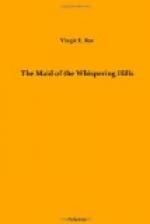Full fifty there seemed to McElroy when he opened his eyes to see them ranged before the line, all armed with knives that shone in the glow, and (grim irony of fate!) in the blades of some there was a familiar stamp—H. B. C.!
“Ah! Yuagh!” called the sachem, and two young men stepped forward, toe on the line, glanced each at a framed picture, drew up an arm, and, “Whut-t-t t-e-e-p,” whined two knives that flittered through the light and struck quivering, one with its cool kiss on McElroy’s cheek, the other just in the edge of the slab at De Courtenay’s shoulder.
A shout of derision greeted this throw, and two more took the place of the retiring braves, this time a Runner of the Burnt Woods, wearing the garments of the white man, but smeared with bars of red and yellow paint across the cheeks, and a white renegade.
“A Nor’wester’s man once,” thought McElroy; “another DesCaut.”
Again the “whut-t” of the whimpering blades, again the little impact in the wood behind, this time with more indifferent aim; for never was white man yet who sank or rose to Indian level in the matter of spear or tomahawk.
They were brave men, these two, and they faced the singing knives without a quiver of muscle, a droop of eye, while the joy of the savages, at last turned loose, rose and rose in its wildness.
For an hour the mob at the line threw and shifted, the vast circle sitting or standing in every attitude of keenest enjoyment. The slabs bristled with steel, to be cleaned and decorated anew, while the fire in the centre leaped and crackled with an hundred voices.
A stone’s-throw away the grim tepee of the dead chief glimmered now out of the shadow, now in, and to the east behind a rocky bluff, through which led a narrow gorge, the river hurried to the north.
Blood-painted brilliant splotches here and there against the white pictures, but neither man was limp in his bonds, neither fair head drooped, neither pair of blue eyes flinched. De Courtenay’s long curls hung like cords of gold against his bare shoulder, enhancing the great beauty of him, while his brilliant smile flashed with uncanny steadiness. McElroy’s face was grave, lips tight, eyes narrow, and forehead furrowed with the thought he strove in vain to make connected.
Suddenly every shade of colour drained out of his countenance, leaving it white as the virgin slab behind.
On the outskirts of the concourse, just at the edge of shadow and light, Edmonton Ridgar stood apart and the look on his face was of mortal agony. As his eyes met those of his factor all doubt was swept away. This was his friend, McElroy knew in that one swift moment, even as he watched his torture, his friend on whose faith and goodness he would stake his soul anew. It was strange what a keen joy surged through him with that subtle knowledge, what smart of tear-mist stung his eyes.
Long their gaze clung, filled with unspeakable things, things that were high as Heaven itself, that pass only between men clean of heart on the Calvaries of earth.




